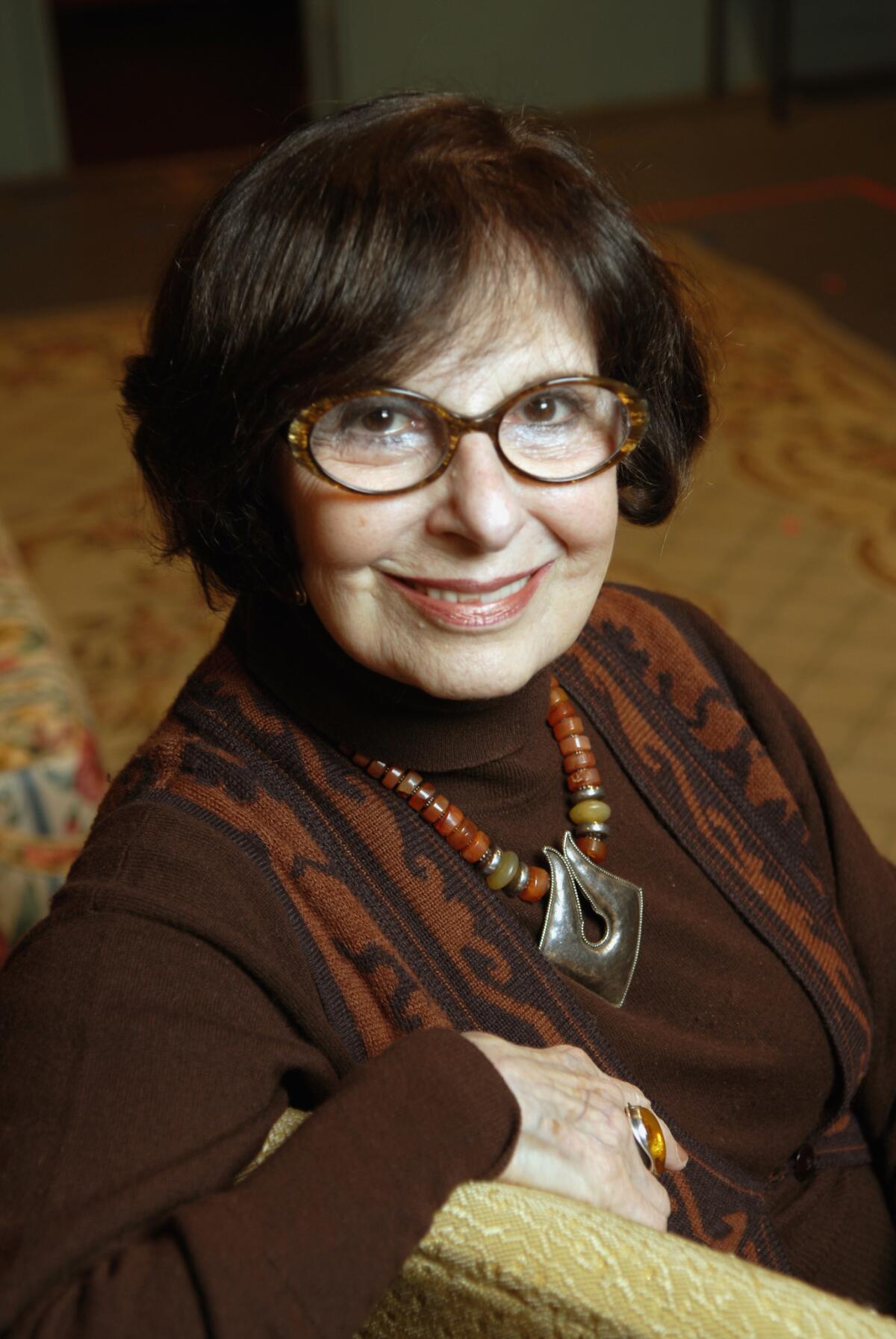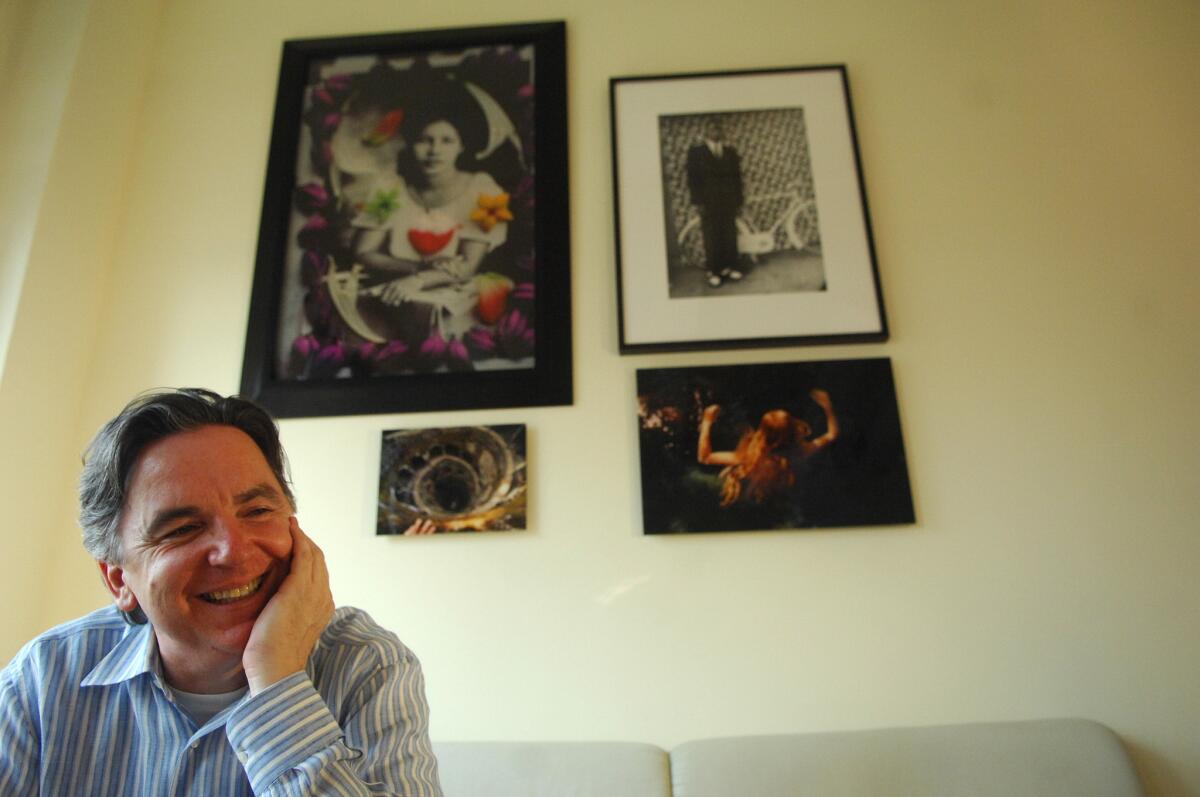Column: Seeking answers to L.A.’s 99-seat theater crisis in the legacies of two theatrical trailblazers
- Share via
The theater world lost two giants this summer, Zelda Fichandler, co-founder of Washington, D.C.’s Arena Stage and a heroic pioneer of the regional theater movement, and James Houghton, founder of New York’s indispensable Signature Theatre Company. They may not be household names, but both can be credited with having rescued the American theater from its own inertia.
I’ve been thinking about the legacies of these artistic directors and how Los Angeles could use their kind of institutional ingenuity. As the legal battle between members of the 99-seat theater community and Actors’ Equity Assn. escalates, with both sides hardening their positions and talking past each other, I can’t help being dismayed by the inability of local theater leaders to reimagine, à la Fichandler and Houghton, a brighter future for this city’s theatrical landscape.
SIGN UP for the free Essential Arts & Culture newsletter »
In 1950, Fichandler, who died at 91 in late July, helped launch in the nation’s capital one of the early nonprofit theaters. Arena Stage was dedicated to promoting theater as an art form when Broadway still had a virtual monopoly on the stage. Fichandler’s mission was to decentralize theatrical excellence. To this end, she not only desegregated her audience but internationalized her programming. Provincialism, she understood, had to be defeated in every quarter for serious theater to thrive.

Against all odds, she was victorious. Arena Stage became, as its website boasts, “the first regional theater to transfer a production to Broadway, the first invited by the U.S. State Department to tour behind the Iron Curtain, and the first to receive the Regional Theater Tony Award.”
But Fichandler’s accomplishment wasn’t just a boon for pols and lobbyists with a taste for Chekhov. The example of the Arena spread like wildfire across the country. As Center Theatre Group artistic director Michael Ritchie said in his statement on Fichandler’s death, “Without the efforts of Zelda, the impetus for the regional-theatre movement to expand to Los Angeles, where our founding Artistic Director Gordon Davidson established Center Theatre Group’s now 50 year legacy beginning in 1967, would not have been possible.”
Houghton, who died earlier this month at 57 from stomach cancer, envisioned a theater that would be devoted each season to the work of a single American playwright. From this simple yet radical notion of believing dramatists worthy of retrospective attention, Signature Theatre Company was born.
But how can an institution that began with the mission of reviving selected works of established authors be described as revolutionary? By the time Houghton, a former actor, began his quest as an artistic director in the early 1990s, even off-Broadway had become infected by Broadway-or-bust commercialism.
Signature offered audiences a new paradigm of play-going, inviting them to experience productions within the context of an author’s body of work. This curatorial approach reignited interest in playwrights who had fallen out of favor with critics (most notably Edward Albee, whose flourishing late career was kick-started by his Signature season). Houghton’s ingenious programming also acquainted a new generation of theatergoers with such path-breaking (and commercially resistant) talents as María Irene Fornés and Adrienne Kennedy.
The theater was designed not as a museum but as a dynamic laboratory for reconsideration. Committed to presenting a cross section of an author’s career, Houghton didn’t merely include lesser-known offerings as a perfunctory gesture. He searched exhaustively for plays that were ripe for rediscovery and, most important, brought in collaborators capable of making it seem as if these works were written expressly for the moment.

Houghton’s ambitious vision kept expanding, despite numerous setbacks. A friend of mine was a Signature donor, and she kept me abreast of developments after I left New York for Los Angeles at the end of 2005. After plans to relocate Signature to the former World Trade Center site came to naught and the financial crisis mushroomed into the Great Recession, I had assumed that the dream of a grand new home for the company was going to be dramatically scaled back.
Every time I return to New York, I’m struck by the way the city (much like pre-“Brexit” London) seems to be catering to global oligarchs and the corporate suits who do their mercenary bidding. While pharmacies, banks, luxury retail chains and multimillion-dollar co-ops proliferate, the arts (excluding world-famous museums and glamorous concert halls happy to name a foyer or stairwell after a billionaire benefactor) have been in survival mode.
Yet not only did Houghton never stop believing, he made the impossible happen. This probably accounts for the tears I surreptitiously flicked away when I first entered the Pershing Square Signature Center, a three-theater facility on West 42nd Street designed by Frank Gehry’s firm. These were as much tears of astonishment for this triumph of genuine value in an age of exorbitant flash as they were tears of gratitude for an artistic director whose revolution on behalf of playwrights had enlarged to include world premieres and multiple residencies.
Artistic leaders with the foresight, fortitude and fight of Fichandler and Houghton are as precious as great artists. The institutions they created out of their passions, convictions and values represent their masterpieces. Originality spurred them on: After surveying the cultural landscape, they didn’t plant what already was blooming but cultivated what was missing, defying the naysayers who questioned the soil and their stamina for the job.
Audra McDonald sublimely interpreted Kander and Ebb’s “First You Dream” from “Steel Pier” on her 2013 recording “Go Back Home,” and her version has been playing in my head as I look back on the accomplishments of these extraordinary trailblazers. McDonald’s voice only gets louder as I turn my attention to the hue and cry being raised by members of Los Angeles’ 99-seat theater community this summer.
The conflict between Actors’ Equity, which wants to ensure that a percentage of actors appearing in 99-seat productions are paid at least the minimum wage, and members of Pro99, a group that believes that enactment of the proposed changes in compensation will devastate the city’s unique intimate theater scene, shows no sign of letting up. A lawsuit, vociferously supported by Pro99 (which believes the union has not heeded the wishes of its own members), has been filed against Actors’ Equity.
Whenever I have waded into this debate, making the argument that the best solution to the stalemate would be some sort of compromise that would provide a feasible economic path for those institutions that have benefited from the old plan while paving the way for a new era in the city’s theater ecology (one more conducive to institutions being able to pay their artists, compete for new plays and widen their audiences), a few passionate theater folks write to remind me of the state of L.A. theater before there was what used to be known as the “Equity Waiver.” Their point is always the same: L.A. is simply not a theater town that can support the kind of vibrant midsized institutions that proliferate in New York and Chicago.
Any tampering apparently will set us back to the dreaded pre-99-seat days of theatrical scarcity. This defense of a system that was developed nearly half a century ago in favor of actors whose principal concern is movie and TV work — a system that has produced a number of deeply committed small theaters along with a vast stream of semi-professional trifle — hinges on the belief that this is the best we can do.
This view is rooted either in stark realism or fear — fear of change and fear that our least optimistic assumptions about our metropolis are true. Having lived in L.A. for only 10 years, I don’t harbor memories of a theatrical Stone Age. But if Davidson could build the Mark Taper Forum into one of the nation’s preeminent venues for serious drama, if the experimental hothouse REDCAT can annex itself onto Walt Disney Concert Hall, if the Geffen Playhouse can raise the money for a sparkling second stage and the downtown-based Center Theatre Group can maintain a third outpost in Culver City and if the Broad Stage in Santa Monica and the Wallis Annenberg Center for the Performing Arts in Beverly Hills can create new performing arts corridors in this sprawling town, I have to believe that Los Angeles, a city that isn’t just the seat of the entertainment industry but a visual art and classical musical mecca, can find a way to create the Los Angeles version of Signature or Playwrights Horizons (another New York miracle).
But even more heartening would be larger, sturdier and more ambitious versions of the Fountain Theatre and Rogue Machine Theatre, two vibrant companies that ought to be encouraged to grow. I’m not contending that this should come through the strong-arm ultimatums of a union that many feel has been unresponsive to local needs. But neither do I think that shoestring operations should be incentivized to perennially maintain their shoestring status.
The market mentality that has pervaded every area of our life equates success with giving the people what they want and relegating everything else to the margins. Fichandler and Houghton triumphed in a different way — they answered a need many didn’t even realize they had.
First, these leaders dreamed. Then, they turned those improbable dreams into lasting legacies.
Follow me @charlesmcnulty
ALSO
Actors' Equity and L.A.'s 99-seat theaters: A brief history
Summer Shakespeare: A critic's take on the secret to theatrical success
Negotiations fail in Actors' Equity 99-seat theater dispute; both sides head for court
The biggest entertainment stories
Get our big stories about Hollywood, film, television, music, arts, culture and more right in your inbox as soon as they publish.
You may occasionally receive promotional content from the Los Angeles Times.








